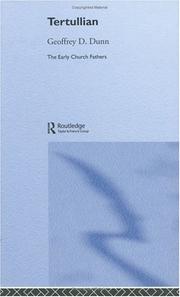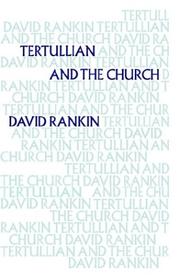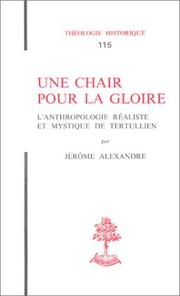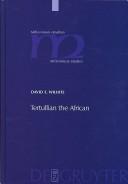| Listing 1 - 10 of 25 | << page >> |
Sort by
|
Book
Abstract | Keywords | Export | Availability | Bookmark
 Loading...
Loading...Choose an application
- Reference Manager
- EndNote
- RefWorks (Direct export to RefWorks)
Pallium --- Church vestments --- Tertullian, --- Tertulian, --- Tertuliano, --- Tertul·lià, --- Tertul·lià, Q. S. Florent, --- Tertulliano, --- Tertulliano, Q. S. F. --- Tertulliano, Quinto Settimio Fiorente, --- Tertullianus, Quintus Septimius Florens --- Tertullianus, Quintus Septimus Florens, --- Tertullien, --- Criticism and interpretation. --- Language.

ISBN: 0415282306 0415282314 9786612778872 1134459319 9786610288731 1280288736 0203652762 1282778870 0203642872 9780415282314 9780415282307 Year: 2004 Publisher: London Routledge
Abstract | Keywords | Export | Availability | Bookmark
 Loading...
Loading...Choose an application
- Reference Manager
- EndNote
- RefWorks (Direct export to RefWorks)
Theology --- Tertullian, --- Tertulian, --- Tertuliano, --- Tertul·lià, --- Tertul·lià, Q. S. Florent, --- Tertulliano, --- Tertulliano, Q. S. F. --- Tertulliano, Quinto Settimio Fiorente, --- Tertullianus, Quintus Septimius Florens --- Tertullianus, Quintus Septimus Florens, --- Tertullien, --- Theology - Early works to 1800 --- Tertullian, - ca. 160-ca. 230
Book
ISSN: 11587032 ISBN: 2851211234 9782851211231 Year: 1992 Volume: 134 Publisher: Paris Institut d'études augustiniennes
Abstract | Keywords | Export | Availability | Bookmark
 Loading...
Loading...Choose an application
- Reference Manager
- EndNote
- RefWorks (Direct export to RefWorks)
Tertullian, --- Filosofia medieval. --- Filosofia patrística. --- Tertullian --- ca. 160-ca. 230 --- Tertullien, --- Tertullianus, Quintus Septimius Florens. --- #GOSA:II.P.TE.M --- Tertullien --- ca. 160-ca. 230. --- Tertulian, --- Tertuliano, --- Tertul·lià, --- Tertul·lià, Q. S. Florent, --- Tertulliano, --- Tertulliano, Q. S. F. --- Tertulliano, Quinto Settimio Fiorente, --- Tertullianus, Quintus Septimius Florens --- Tertullianus, Quintus Septimus Florens, --- Ca. 160-ca. 230. --- Tertullian, - approximately 160-approximately 230
Book
ISBN: 3519076764 Year: 1999 Volume: 127 Publisher: Stuttgart Teubner
Abstract | Keywords | Export | Availability | Bookmark
 Loading...
Loading...Choose an application
- Reference Manager
- EndNote
- RefWorks (Direct export to RefWorks)
Theology, Doctrinal --- Théologie dogmatique --- History --- Histoire --- Tertullian, --- Language --- Latin language --- -Classical languages --- Italic languages and dialects --- Classical philology --- Latin philology --- New words --- Tertullian --- -New words --- Tertullien --- Théologie dogmatique --- Classical languages --- Tertulian, --- Tertuliano, --- Tertul·lià, --- Tertul·lià, Q. S. Florent, --- Tertulliano, --- Tertulliano, Q. S. F. --- Tertulliano, Quinto Settimio Fiorente, --- Tertullianus, Quintus Septimius Florens --- Tertullianus, Quintus Septimus Florens, --- Tertullien, --- Language.
Book
ISBN: 3880969035 9783880969032 Year: 1989 Volume: 3 Publisher: Sankt Ottilien EOS
Abstract | Keywords | Export | Availability | Bookmark
 Loading...
Loading...Choose an application
- Reference Manager
- EndNote
- RefWorks (Direct export to RefWorks)
Tertullian --- 276 =71 TERTULLIANUS, QUINTUS SEPTIMUS FLORENS --- Latijnse patrologie--TERTULLIANUS, QUINTUS SEPTIMUS FLORENS --- Tertullien --- Tertullian, --- Tertulian, --- Tertuliano, --- Tertul·lià, --- Tertul·lià, Q. S. Florent, --- Tertulliano, --- Tertulliano, Q. S. F. --- Tertulliano, Quinto Settimio Fiorente, --- Tertullianus, Quintus Septimius Florens --- Tertullianus, Quintus Septimus Florens, --- Tertullien,
Book
ISBN: 9782503555782 2503555780 Year: 2015 Volume: 70 Publisher: Turnhout Brepols
Abstract | Keywords | Export | Availability | Bookmark
 Loading...
Loading...Choose an application
- Reference Manager
- EndNote
- RefWorks (Direct export to RefWorks)
Premier Père de l’Église latin d’Afrique, Tertullien (160-220) a marqué de son empreinte le christianisme de l’Occident. Cependant, si son influence sur des auteurs comme Jérôme ou Isidore de Séville a souvent été soulignée, peu d’études ont été consacrées au rôle théologique, spirituel et littéraire que son œuvre volumineuse a joué dans le développement de la pensée et de la langue des écrivains chrétiens d’Afrique durant l’Antiquité tardive. Pourtant, ce rôle est assez bien documenté, comme l’attestent les témoignages, certes parfois contradictoires, de grands écrivains chrétiens africains comme Cyprien, Lactance ou Augustin. Aussi nous semblait-il nécessaire de nous interroger à nouveaux frais sur l’influence de Tertullien sur la littérature chrétienne d’Afrique du Nord (IIe-VIe siècles), à travers une étude tant des formes littéraires, des contenus dogmatiques, que des contextes ecclésiologiques de sa réception. Au final, les travaux de cette journée d’étude, organisée dans le cadre du programme de recherche du G.R.A.A., « Tradition, évolution et mutation des formes littéraires en Afrique romaine », offrent quelques éclaircissements à la question fondamentale de la construction, réelle, imaginaire ou fantasmée, d’une « africanité » de la littérature chrétienne d’Afrique du Nord.
Christian literature, Early --- 276 =71 TERTULLIANUS, QUINTUS SEPTIMUS FLORENS --- Early Christian literature --- Patristic literature --- Latin authors --- History and criticism --- Latijnse patrologie--TERTULLIANUS, QUINTUS SEPTIMUS FLORENS --- Tertullian, --- Tertulian, --- Tertuliano, --- Tertul·lià, --- Tertul·lià, Q. S. Florent, --- Tertulliano, --- Tertulliano, Q. S. F. --- Tertulliano, Quinto Settimio Fiorente, --- Tertullianus, Quintus Septimius Florens --- Tertullianus, Quintus Septimus Florens, --- Tertullien, --- Influence --- Conferences - Meetings --- Tertullianus
Multi
ISBN: 9140050750 Year: 1984 Publisher: Lund Gleerup
Abstract | Keywords | Export | Availability | Bookmark
 Loading...
Loading...Choose an application
- Reference Manager
- EndNote
- RefWorks (Direct export to RefWorks)
Satisfaction for sin --- -Atonement --- History of doctrines --- -Tertullian --- -Contributions in doctrine of satisfaction for sin --- Tertullian, --- -History of doctrines --- -Tertullien --- Tertullian --- Contributions in doctrine of satisfaction for sin --- Tertulian, --- Tertuliano, --- Tertul·lià, --- Tertul·lià, Q. S. Florent, --- Tertulliano, --- Tertulliano, Q. S. F. --- Tertulliano, Quinto Settimio Fiorente, --- Tertullianus, Quintus Septimius Florens --- Tertullianus, Quintus Septimus Florens, --- Tertullien, --- Atonement --- Tertullien (0155?-0222?)

ISBN: 0521480671 0521044006 0511520204 0511887302 Year: 1995 Publisher: Cambridge : Cambridge University Press,
Abstract | Keywords | Export | Availability | Bookmark
 Loading...
Loading...Choose an application
- Reference Manager
- EndNote
- RefWorks (Direct export to RefWorks)
Was Tertullian of Carthage a schismatic? How did he view the Church and its bishops? How did he understand the exercise of authority within the Church? In this study David Rankin sets the writings of Tertullian in the context of the early third-century Church and the developments it was undergoing in relation to both its structures and its self-understanding. He then discusses Tertullian's own theology of the Church, his imagery and his perception of Church office and ministry. Tertullian maintained throughout his career a high view of the Church, and this in part constituted the motivation for his vitriolic attacks on the Church's hierarchy after he had joined the New Prophecy movement. His contribution to the development of the Church has often been misunderstood, and this thorough exploration provides a reassessment of its nature and importance.
Church --- Montanism --- 276 =71 TERTULLIANUS, QUINTUS SEPTIMUS FLORENS --- Christian heresies --- Ecclesiastical theology --- Ecclesiology --- Theology, Ecclesiastical --- People of God --- Theology --- Authority --- History of doctrines --- Latijnse patrologie--TERTULLIANUS, QUINTUS SEPTIMUS FLORENS --- History --- Tertullian, --- Tertulian, --- Tertuliano, --- Tertul·lià, --- Tertul·lià, Q. S. Florent, --- Tertulliano, --- Tertulliano, Q. S. F. --- Tertulliano, Quinto Settimio Fiorente, --- Tertullianus, Quintus Septimius Florens --- Tertullianus, Quintus Septimus Florens, --- Tertullien, --- Arts and Humanities --- Religion --- Montanism.

ISBN: 2701014220 2701017297 9782701014227 Year: 2001 Volume: 115 Publisher: Paris Beauchesne
Abstract | Keywords | Export | Availability | Bookmark
 Loading...
Loading...Choose an application
- Reference Manager
- EndNote
- RefWorks (Direct export to RefWorks)
Man (Christian theology) --- Homme (Théologie chrétienne) --- Tertullian, --- Theological anthropology --- Christianity --- 276 =71 TERTULLIANUS, QUINTUS SEPTIMUS FLORENS --- #GOSA:II.P.TE.M --- Latijnse patrologie--TERTULLIANUS, QUINTUS SEPTIMUS FLORENS --- Homme (Théologie chrétienne) --- Christianity. --- Tertulian, --- Tertuliano, --- Tertul·lià, --- Tertul·lià, Q. S. Florent, --- Tertulliano, --- Tertulliano, Q. S. F. --- Tertulliano, Quinto Settimio Fiorente, --- Tertullianus, Quintus Septimius Florens --- Tertullianus, Quintus Septimus Florens, --- Tertullien, --- Criticism and interpretation. --- Theological anthropology - Christianity

ISBN: 9783110194531 3110194538 3110926261 9783110926262 Year: 2007 Volume: 14 Publisher: Berlin ; New York : De Gruyter,
Abstract | Keywords | Export | Availability | Bookmark
 Loading...
Loading...Choose an application
- Reference Manager
- EndNote
- RefWorks (Direct export to RefWorks)
Who was Tertullian, and what can we know about him? This work explores his social identities, focusing on his North African milieu. Theories from the discipline of social/cultural anthropology, including kinship, class and ethnicity, are accommodated and applied to selections of Tertullian's writings. In light of postcolonial concerns, this study utilizes the categories of Roman colonizers, indigenous Africans and new elites. The third category, new elites, is actually intended to destabilize the other two, denying any "essential" Roman or African identity. Thereafter, samples from Tertullian's writings serve to illustrate comparisons of his own identities and the identities of his rhetorical opponents. The overall study finds Tertullian's identities to be manifold, complex and discursive. Additionally, his writings are understood to reflect antagonism toward Romans, including Christian Romans (which is significant for his so-called Montanism), and Romanized Africans. While Tertullian accommodates much from Graeco-Roman literature, laws and customs, he nevertheless retains a strongly stated non-Roman-ness and an African-ity, which is highlighted in the present monograph.
Theology --- Ethnology --- Théologie --- Anthropologie sociale et culturelle --- Tertullian, --- Criticism and interpretation --- 276 =71 TERTULLIANUS, QUINTUS SEPTIMUS FLORENS --- Latijnse patrologie--TERTULLIANUS, QUINTUS SEPTIMUS FLORENS --- Tertullian. --- Tertullien --- Tertullian --- Théologie --- Tertullianus, Quintus Septimus Florens --- Tertulian, --- Tertuliano, --- Tertul·lià, --- Tertul·lià, Q. S. Florent, --- Tertulliano, --- Tertulliano, Q. S. F. --- Tertulliano, Quinto Settimio Fiorente, --- Tertullianus, Quintus Septimius Florens --- Tertullianus, Quintus Septimus Florens, --- Tertullien, --- Criticism and interpretation. --- African Christianity. --- Montanism. --- Roman Africa.
| Listing 1 - 10 of 25 | << page >> |
Sort by
|

 Search
Search Feedback
Feedback About
About Help
Help News
News